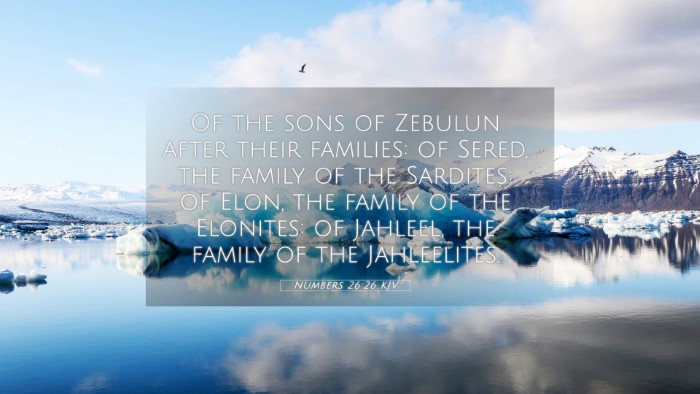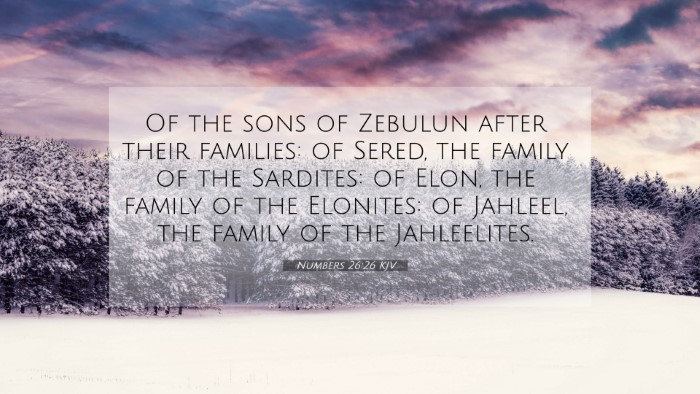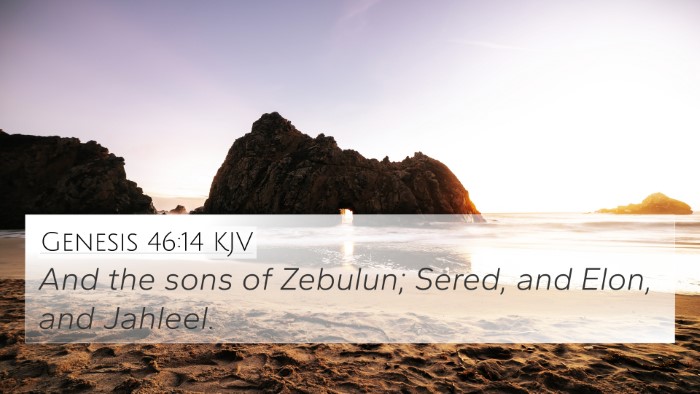Understanding Numbers 26:26
The verse Numbers 26:26 is a significant passage in the Bible that deals with the genealogical records of the tribes of Israel. This verse specifically mentions the descendants of the tribe of Joseph, highlighting important aspects of heritage and divine promise.
In this exposition, we will explore the meaning of this verse using insights from notable public domain commentaries, which aid in providing a deeper understanding of the text.
Verse Text
Numbers 26:26 (KJV): "These are the children of Joseph after their families: Manasseh and Ephraim."
Commentary Insights
This verse serves as part of a broader census that highlights the tribes of Israel and their divisions. The implication of including Joseph’s sons—Manasseh and Ephraim—serves several theological and historical purposes:
-
Theological Significance:
Matthew Henry notes that Joseph, despite being sold into slavery, became a key figure in God’s plan for Israel, symbolizing divine providence and blessing. Each tribe listed represents the faithfulness of God to His promise to Abraham, Isaac, and Jacob.
-
Historical Context:
Albert Barnes highlights the importance of recognizing that Joseph's two sons, Manasseh and Ephraim, effectively received the birthright blessings, leading to their significant roles within the Israelite nation. This reflects the fulfillment of God’s promises despite human actions that seemed contrary.
-
Genealogical Importance:
Adam Clarke elucidates that the genealogy recorded in this chapter serves to establish territorial claims, responsibilities, and roles within the Israelite community. Understanding lineage was vital for inheritance rights and tribal governance.
Cross-References and Connections
To appreciate the full meaning of Numbers 26:26, it is useful to explore several cross-referenced verses that illuminate the relationships between different Biblical texts:
- Genesis 48:5-6: Jacob blesses Joseph's sons and elevates them to the status of tribes.
- Joshua 17:14-18: Details the inheritance given to the descendants of Manasseh, showcasing the fulfillment of God's promise.
- 1 Chronicles 5:1-2: Further establishes the inheritance rights of Joseph’s descendants in the genealogical context.
- Deuteronomy 33:13-17: Moses' blessings upon Joseph emphasize the fruitfulness and strength of his lineage.
- Matthew 1:2-16: The genealogy in the New Testament connects Joseph back to the Old Testament, illustrating Christ's lineage and fulfillment of promises.
- Hebrews 7:14: References Jesus' lineage from the tribe of Judah while acknowledging the significance of the other tribes.
- Revelation 7:6: Lists the tribes, affirming the continuation and importance of these families in God's ultimate plan.
Thematic Connections
The themes within Numbers 26:26 extend beyond genealogy into areas such as:
-
Divine Promises:
The continuation of God’s promise through generations emphasizes His faithfulness.
-
Identity and Heritage:
The record of tribes helps maintain individual and collective identity among the Israelites.
-
God’s Sovereignty:
This verse illustrates God’s control over history and His chosen people, ensuring that His plans are realized.
Conclusion
Understanding Numbers 26:26 requires looking at how it fits within the larger narrative of Scripture, particularly through cross-references. This genealogical verse serves not only as a record but also as a testament to God’s ongoing relationship with His people, their identities, and the unfolding story of salvation throughout both the Old and New Testaments.
For those studying the Bible, tools for Bible cross-referencing can enhance understanding and reveal the interconnectedness of scripture. This verse demonstrates the vital importance of recognizing biblical themes and the relations between different passages, thereby enriching one’s study and appreciation of the Word of God.




